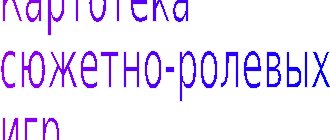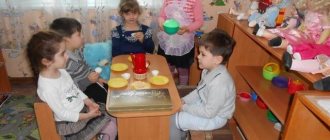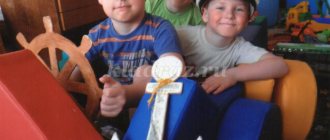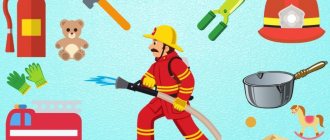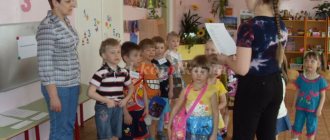Summary of the travel game in the middle group of kindergarten
Summary of the game in the middle group on the topic: “An exciting journey by sea.”
Author: Olga Aleksandrovna Frantsuzova, teacher at MBDOU kindergarten No. 2 in the village. Novozavidovsky, Konakovsky district, Tver region. Purpose: this summary is intended for teachers, educators and creative people working with children. Goal: creating an emotionally positive mood in the group. Objectives: to consolidate children’s knowledge about the underwater world and its inhabitants; Expand words knowledge; develop imagination, expressiveness of movements, facial expressions; develop the ability to listen to the sounds of nature; to form a desire to communicate in the game with peers and adults. Preliminary work: learning poetry, looking at illustrations of animals and plants, living in bodies of water, playing together. Methodical techniques: game situation, conversation-dialogue
Progress of the lesson.
Educator. Come on, let's go on an exciting journey by sea. Children. Let's. Educator . We will need to go through an interesting but difficult path with adventures and obstacles. Therefore, at each stage of our journey you will perform different tasks and exercises. And now I want to ask, who knows and can tell poems about the river, sea or aquatic inhabitants? Children recite poems. Educator. Children, do you want to go to the sea?
Children. Yes. Educator. Then you need to carefully jump on large and small pebbles. You are ready? Children. Yes. Educator. So we got to the water. Now let's lie down on the sand. Let's lie down and listen to the sound of the sea, and maybe the birds singing. We will lie down and gain magical strength to continue our journey. (Music accompaniment is turned on - the sound of the sea, birdsong). Children, having taken a comfortable position, lie with their eyes closed. The teacher gives instructions for calm and relaxation, calm breathing: “you see the wonderful sea, hear the sound of the waves, how the birds sing, how the sun shines, you are calm, relaxed, filled with magical power.” Educator. Have you rested and gained magical power? Children. Yes. Educator. Now get up. How many of you can repeat the sound of the waves? The children answer. Educator . All? Well done. (Breathing exercise: standing, while inhaling, we smoothly raise our arms up, bend forward, while exhaling, lower our arms, return to the starting position: “Shhhhhhh”). Educator. Children, if there were big waves at sea and a strong wind was blowing, would we be able to go on a trip by sea? Children. No. Educator. And why? The children answer. Educator. Before we set off further, we need to practice being captains a little. "Brave Captain" I’m standing on the bridge (legs spread wide and hands on my belt) and holding binoculars in my hands. (use your fingers to depict binoculars, bring the binoculars to your eyes) The waves splash lightly, (depict a light wave with both hands) The rocking is quiet for now, (sway from side to side) The waves suddenly became strong (depict an intense wave with your hands) And from the rocking everyone fell . (squat down) I hold on to the rope tightly, (clench my fists tightly and pretend to be tugging at the rope) Suddenly the wind blew my cap off, (raise my hand to my head and sharply move them to the side) I began to catch it with my hand, (make several movements in the air, first with one , then with the other hand) Almost fell off the bridge. (balance, arms to the sides) Educator. Did you like being captains? Children. Yes.
Educator. Now let's go boating? Children. Let's. Educator . Get into the boats. Is everyone seated? Children. Yes. Educator . Is it convenient for you? Children. Yes. Educator. Can you row an oar? Children. No. Educator . Watch me do it. Now you try it. It turns out? Children. Yes. Educator . Great! Well, then let's swim. The children answer. Educator. Children, look, there is a fish swimming there! And here's another, and another. Oh, there are so many of them!
Children do hand exercises: “Fish”. (Make wave-like movements with the entire hand (the palm “looks” at itself). Move the hand in all directions: right-left, back-and-forth, up and down to the length of an outstretched arm. The exercise lasts 15-20 seconds.) Educator. Guys, who else lives in the sea? The children answer. Educator . That's right, octopus.
We perform the “Octopus” exercise. (Place your hand on the floor, touching it with the pads of your fingers, wrist up. Fingers apart. Perform movements on the floor with each finger separately. Perform alternately, then with the right and then with the left hand, then with both hands simultaneously. Perform for 15-20 seconds.) Educator . Do you think plants live in water? The children answer. Educator. What plants live in water? Name it. The children answer. Educator. Everything is correct. Algae, duckweed, and water lilies grow in the water.
Educator. Oh, guys, the wind suddenly blew (show) and the waves rose.
Exercise "Wave". (Place your hands in front of you, palms down, spread your fingers. Make wave-like movements in turn with each finger separately. Perform the exercise with both the fingers of one hand and the fingers of both hands at the same time. Perform the exercise for 15-20 seconds.) Educator . Our boats rocked on the waves. Be careful, swim closer to me. Look, a funnel has formed in the distance and can suck us in. Be careful and careful. Perform the dynamic exercise “Funnel”. (Rotate your head, shoulders and chest in a circle. Perform the exercise first clockwise and then counterclockwise. The exercise lasts 15-20 seconds.) Educator. Look, children, we have sailed very far! It's time for us to return home. Which way should we sail? The children answer. Educator. I don't see anything. Let's take a closer look and do the “Far-Close” eye exercise. (Children look through a telescope or binoculars. The teacher first names a distant object, and after 2-3 seconds an object located close. Children try to quickly find the objects that the teacher names. Repeat the exercise 6-8 times). Educator. Children, does anyone see the lighthouse? The children answer. Educator. I think I saw him. Look to the right. Do you see? Children. Yes.
Breathing exercise “Lighthouse”. (Swinging your head back and forth. When performing the exercise, for each sway you need to take an energetic and impetuous inhale, and then exhale. Perform for 10 seconds. Educator. Let’s swim quickly towards the lighthouse, otherwise the sea is very rough. It’s time for us to go to the shore, home. Go ahead. ... Well, here we are on the shore, everyone get out of the boats. We will play an interesting game with you, it’s called “Sea - Land”. For this game you will need hoops. The hoop is placed on the floor. Inside the hoop is the sea, and outside - land. On the command “sea”, children must jump into the hoop. On the command “land”, children must be outside the hoop. Thank you for your attention!
We recommend watching:
Entertainment game for children of the middle group Didactic games for preschoolers 3 - 5 years old Plotless Russian folk games for preschoolers Card index of didactic games for introducing the plant world to children of the middle group
Similar articles:
Summary of a game lesson for older preschoolers
Game "Cabbage" for older children
Games for middle school children in kindergarten
Developmental tasks on logic for children 4-5 years old
Attention tasks for children 4-5 years old in pictures
MAGAZINE Preschooler.RF
Municipal budgetary preschool educational institution "Kindergarten of a combined type No. 335" of the Samara urban districtSummary of a role-playing game based on the Russian folk tale “Kolobok” in the middle group
Educator: Galkina Elena Viktorovna Samara 2013
Target. Development and enrichment of game plots.
Integration of educational areas. “Socialization”: develop children’s ability to interact and get along with each other in a short game together. “Communication”: involving children in conversation during play. “Cognition” (formation of elementary mathematical concepts): develop the ability to correlate quantities “Music”: form emotional responsiveness to a piece of music.
Game material. Masks of the characters from the fairy tale “Kolobok”: grandfather, woman, bun, hare, wolf, bear, fox; Masha doll, playware.
Preparing for the game. Reading the Russian folk tale “Kolobok”, looking at illustrations for the tale, dramatizing the fairy tale “Kolobok”, making animal masks, games “Treat”, “Birthday”, etc.
Progress of the game. The teacher includes the children in the game: “Guys, come here quickly. Look who came to us." Shows the doll Masha.
Masha - Hello, my name is Masha. I ran away from my grandparents and am walking alone. Where am I?
Children - Hello. You're in kindergarten.
Voss - Masha, don’t you know that you can’t run away from your grandparents! An unpleasant thing happened to the kolobok when he ran away from his grandfather and woman.
Masha - What's the story?
Voss - Guys, let's tell and show Masha the story about the kolobok?!
Children - Yes.
Vos-l - Once upon a time there lived a grandfather and a woman. Who wants to be a grandfather? (puts a grandfather mask on the child’s head). Who wants to be a woman? (puts a woman’s mask on the child’s head and other masks at the children’s request). Where will the woman and grandfather live?
Children - In the house (the area of the house is fenced off with chairs).
Vos-l - And where the hare, wolf, bear, fox will wait for the bun (places for them are also determined). My grandfather once asked.
Grandfather - Bake a bun, grandma.
Baba - There is no flour.
Grandfather - And you mark the barn, scrape the bottom of the tree, and there will be enough.
Vos-l - Baba did just that: she swept, scraped together two handfuls of flour, kneaded the dough with sour cream. She rolled it into a bun, fried it in oil and put it on the window to cool (the woman imitates the movements). The bun got tired of lying: it rolled off the window onto the path and rolled further and further. A bun is rolling along the path, and a hare meets it.
Hare - Kolobok, Kolobok! I will eat you!
Kolobok - No, don’t eat me, hare, but rather listen to what song I’ll sing for you. (And the bun began to sing.) I am a bun, a bun!
It's sweeping through the barn,
Scratching the bottom of the barrel,
Mixed with sour cream,
I left my grandfather
I left my grandmother
I'll leave you, hare.
Vos-l - And the bun rolled further - only the hare saw it. A bun is rolling along a path in the forest, and a gray wolf meets it.
Wolf - Kolobok, Kolobok! I will eat you!
Kolobok - Don’t eat me, gray wolf: I’ll sing you a song. And the bun began to sing. (Kolobok sings a song.)
Voss - The bun rolled further - only the wolf saw it. The bun is rolling through the forest, and a bear is walking towards it.
Bear - Kolobok, Kolobok, I will eat you!
Kolobok - Well, where can you, clubfoot, eat me! Better listen to my song (the bun sings a song).
Voss - And the bun rolled - the bear just looked after it. The bun rolls, and a fox meets it.
Fox - Hello, bun! How handsome and rosy you are!
Vos-l - Kolobok is glad that he was praised, and began to sing his song (the Kolobok sings a song), and the fox is creeping closer and closer.
Fox - Nice song! Yes, the trouble is that I have become old, I can’t hear well. Sit on my toe and sing it one more time.
Vos-l - Kolobok was glad that the song was praised, jumped on the fox’s toe, and sang:
Kolobok - I am a Kolobok, Kolobok!..
Voss - And his fox is a racket! - and ate it (removes the kolobok mask from the child). Here's a sad story about Kolobok, who ran away from Baba and Grandfather.
Masha - I will never run away from home again. (A voice is heard calling Masha).
Masha - My grandmother is calling me, I’ll go home. Goodbye.
Vos - Goodbye. That’s the end of the tale, and well done to those who listened.
Bibliography
- 1.Russian folk tale “Kolobok”, adapted by K. Ushinsky.
- 2. Mikhailenko N.Ya., Korotkova N.A. Organizing a story-based game in kindergarten: A manual for teachers. – M., 2000. 3. From birth to school. Sample basic general education program for preschool education. / Ed. NOT. Veraksy, T.S. Komarova, M.A. Vasilyeva. – 2nd ed., rev. and additional – M.: Mozaika-Sintez, 2011. – 336 p.
- 4. Krasnoshchekova N.V. Role-playing games for preschool children / R.V. Krasnoshchekova. Ed. 4th. – Rostov n/d.: Phoenix, 2008. -251 p.
| Next > |
